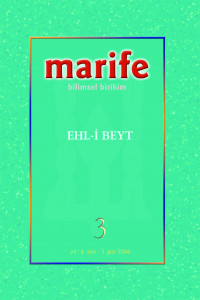Abstract
................................................................................................................................................................................................................................................................................................
References
- ........................................................................................................................................................................................................................................................................................................
Abstract
In the Qur’an the phrase of ahl al-bayt (the people of the house) occurs three times. Once in sura 33:73, applied to the house of Ibrahim; the second passage, 33:33 ("God only wants to remove from you all might be loathsome, O you members of the [Prophet’s] household, and to purify you to utmost purity"), serves as the proof-text for its application to the house of Muhammad. The third passage, 28:12, applied to the house of Moses. The precise interpretation of the term in 33:33, gave rise to differences of opinion. Among the Shi‘a it was applied to Muhammad, Ali, Fatima, al-Hasan and al-Husayn by interpreting the verse through the wellknown "tradition of the mantle" (hadith al-kisa), which was accepted also in the Sunni circles. In keeping with an explanation of the Qur’anic phrase as referring to the Prophet’s wives and dependents, attributed to Ibn Abbas and Ikrima, Umm Salama is, in some versions of this tradition, recognized by the Prophet as belonging to the ahl al-bayt. The current orthodox view is based on a harmonizing opinion, according to which the term ahl al-bayt includes the ahl al-aba, i.e. the Prophet, Ali, Fatima, al-Hasan and al-Husayn, together with the wives of the Prophet.
References
- ........................................................................................................................................................................................................................................................................................................
Details
| Primary Language | Turkish |
|---|---|
| Subjects | Religion, Society and Culture Studies |
| Journal Section | Research Article |
| Authors | |
| Publication Date | December 31, 2004 |
| Published in Issue | Year 2004 Volume: 4 Issue: 3 |
This work is licensed under a Creative Commons Attribution-NonCommercial 4.0 International License.

